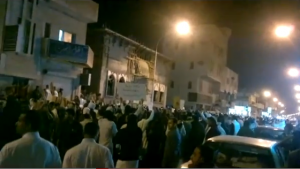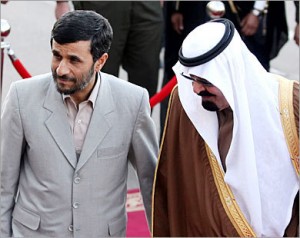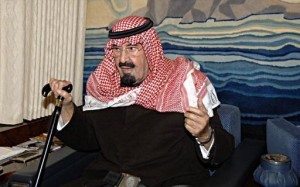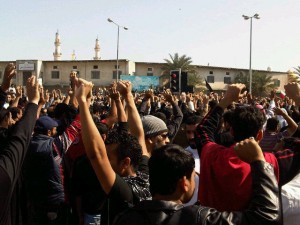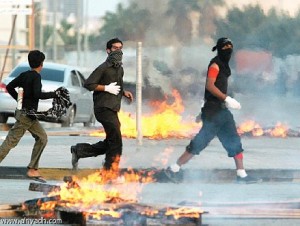
As political unrest shakes its tiny Gulf ally Bahrain, much more is at stake for the United States than just the fate of the US Fifth Fleet’s base, analysts said.
Also in play are Washington’s extensive strategic ties with Bahrain’s influential oil-rich neighbor Saudi Arabia and efforts by US arch-foe Iran to spread its influence from across the Gulf, they said.
In many ways, the unrest in Bahrain “is much more dangerous” for the US than the current state of affairs in Egypt, more than a week after mass protests forced president Hosni Mubarak to step down, said analyst Aaron David Miller.
To be sure, Egypt has greater weight than Bahrain, said Miller, a former State Department analyst and negotiator who is now an analyst with the Woodrow Wilson International Center for Scholars.
It is the largest and most powerful Arab state, has a peace treaty with Israel and receives $1.3 billion in US military aid each year.
And the Egyptian-US alliance remains intact, at least for now.
However, Bahrain’s vulnerability “to more convulsive change and the impact that it could have vis-a-vis Arab policy for Iran, Saudi Arabia and the rest of the Gulf makes it … a more hot-button issue right now,” Miller told AFP.
The Sunni Arab leaders of Bahrain and Saudi Arabia, who govern over restive Shiite Arab populations near Shiite but non-Arab Iran, fear Washington’s push for reform will sow greater instability, said analyst Patrick Clawson.
They strongly opposed Washington’s pressure on Egypt for a transition to democracy to ease out Mubarak, according to Clawson, deputy director for research at the Washington Institute for Near East Policy.
“The perception in the (Gulf) region is that democracy means either the complete chaos you had in Iraq or else the stasis and bickering you had in Kuwait,” he said.
And if needed, the Saudis may be prepared to repeat their intervention in Bahrain in the 1990s, when they sent armored personnel carriers across the causeway linking the neighbors.
“So the Saudis are in a position to ensure that things don’t get out of hand in Bahrain and they are of a mind to do that. That is a powerful constraint to what the United States can do under these circumstances,” Clawson said.
The course of events could put a strain on the US-Saudi strategic relationship, which involves US military bases and billions of dollars in US weapons sales, as well as close cooperation on regional diplomacy and counter-terrorism.
Bahrain, fearing Iran’s meddling, may continue taking a tough line toward unrest, although Bahraini security forces withdrew Saturday from a Manama square that had been the focal point of bloody anti-regime protests.
The implications of the apparently conciliatory move were not immediately clear.
“The Gulf rulers will be petrified that there is an Iranian influence in all of this, but I think the Iranians will be pretty incompetent” in trying to gain influence in the region, Clawson said, noting that will not prevent them from making a “good attempt” to do so.
What’s more, he said, Arab Shiites increasingly look to their own leaders rather than Iran for guidance.
Nonetheless, analysts expressed concern about Iran.
“The issue of Iran is critical. What is a good outcome for us?” Miller asked.
“Here you have Iranian access to that Shia majority. You could argue that an Iraq-like outcome is not out of the question,” he continued, referring to how Shiites now dominate affairs in Baghdad with some backed by Iran.
Michelle Dunne, a former Middle East specialist at the State Department, agreed that the Saudis would have a hard time accepting political change in Bahrain and that the Iranians would try to exploit instability there.
“The Bahraini problem is definitely a home-grown problem,” said Dunne, now a senior associate with the Carnegie Endowment for International Peace.
“This is not Iran manipulating the politics of an Arab state, but the Bahraini Shia are desperate. They will accept support from where they can get it.”
As for the naval base, analysts said its presence is not currently the focus of Shiite-driven protests, though it could develop as such if protesters eventually succeed in changing the government.
“At some point, that’s going to be rethought… whether it’s appropriate to have a US naval base there or not,” said Dunne.
Anthony Cordesman, a former Defense Department intelligence analyst, said the US base in Bahrain is “very important” in light of the “steady buildup” by the naval branch of Iran’s Revolutionary Guards over the past decade.



